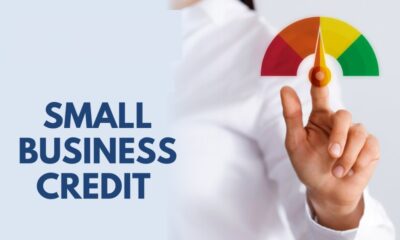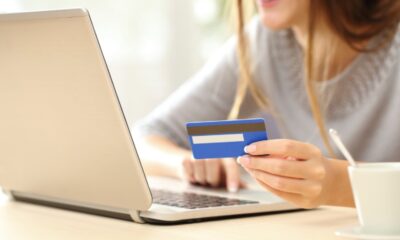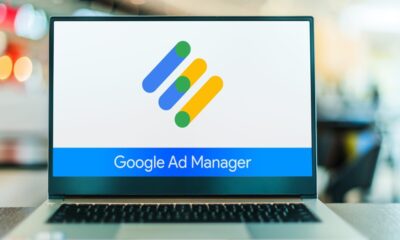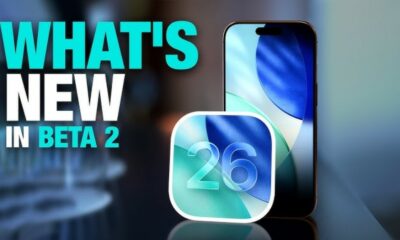Startup
Benefits of Using Credit Cards: When to Use Them for Large Purchases
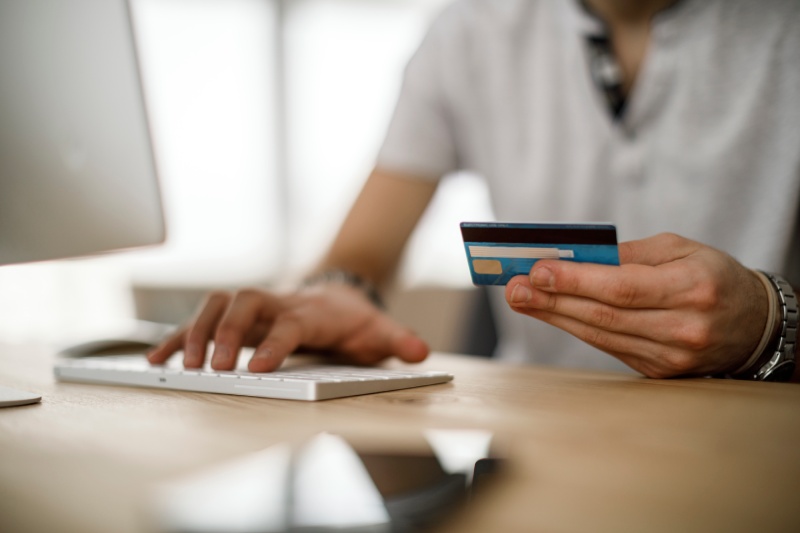
Let’s say you have an unexpected expense, are renovating your house, or are paying for a significant vacation. There must be a source of funding, and you may be considering using a credit card to make the purchase.
For major purchases, you might think about using a credit card, but there’s a risk of accruing interest charges and having your credit score impacted. However, for a large expense, a card with a 0% intro APR or high-earning rewards might be a better choice. All that matters is how you use the card and when you have the money to pay it off.
Find out more about when to use a credit card for large purchases and when not to.
Advantages of making a big purchase with a credit card
When considering charging a large amount to your credit card, it’s helpful to consider the advantages and disadvantages. Here are some reasons why making a sizable purchase with a credit card might be advantageous for you.
Sign-up bonus
Certain credit cards with rewards provide new users with a sizable sign-up bonus, frequently in the form of miles, points, or cash back. Usually, you have to spend a certain amount within the first few months to qualify for the bonus. If you’re in the market for a new credit card and need to make a large purchase soon, now could be a good time to meet your minimum spending requirement and take advantage of any welcome bonuses the card may offer.
0 percent intro APR
For a significant purchase, a new credit card with an introductory APR of 0% might be a wise option. You will still have to pay the required minimum each month. Should you fail to do so, the introductory rate may be terminated by your issuer and you will be assessed the standard interest rate. However, you might have more than a year to pay off a sizable credit card debt with this method.
Rewards
You may be able to earn money on a large purchase by using a flat-rate, tiered, or rotating spending category if you have a rewards card. Or you could accrue miles or points that you could use toward your subsequent trip. Getting the most out of your credit card rewards strategy can come from earning rewards on a big purchase that you must make anyhow. Just keep in mind that getting rewards is never an excuse to take on debt. Only think about accruing rewards on a sizable credit card purchase if you are certain you can pay it off without paying interest.
Card advantages
Credit cards can come with hidden benefits in addition to rewards that can improve or protect your purchase.
For example, if you’re buying a new appliance, extended warranty protection might be beneficial. For that important trip, travel insurance and complimentary checked baggage may come in handy. And if your new smartphone is stolen, purchase protection can guarantee that you will be protected.
Buy now, pay later
A growing number of credit cards allow users to make large purchases now and pay for them later. You might be able to pay for the entire purchase throughout several billing cycles rather than all at once.
A buy now, pay later option typically entails interest fees from the issuer, but these fees are frequently fixed and less expensive than those associated with standard credit card interest. Furthermore, even though spreading out a large payment over time can be beneficial, debt still exists. Verify that you can make the monthly payments.
Emergency help
Using a credit card might be your best—or only—option if you have an emergency and must pay for immediate expenses. You might want to apply for a brand-new credit card with a lengthy introductory period that offers 0% intro APR. You should pay the minimum amount every month. To avoid being taken aback by the standard APR, however, be sure you are aware of when the period ends. To avoid paying interest, you should ideally pay off the remaining amount by then.
Speak with a credit counselor for more guidance on reducing debt while covering emergencies.
Risks of using a credit card for a large purchase
Even though it might be alluring to use your card to purchase a large item, reconsider if you won’t have the money available to settle the balance after the billing cycle. Here are some hazards to think about.
Interest fees
Spending more than you can afford is never a good idea, and interest charges on a credit card debt that you are unable to pay off quickly can mount up. It’s best to only use your credit card for purchases you can afford to pay off at the end of the billing cycle because the average credit card interest rate is currently quite high, at about 20 percent.
Additionally, having a balance may lower your credit score.
Impact on credit score
The utilization ratio of your credit is another element that influences your credit score. The ratio of your credit utilization to your available credit indicates how much credit you are actually using. Experts advise avoiding using more than 30% of your credit.
Using a credit card for a large purchase could put you dangerously close to your credit limit. Additionally, it could have a bad effect on your credit score if you don’t pay off the balance right away.
How to plan for a large credit card purchase
You can figure out how long it will take to pay off a large purchase without paying interest if you’re planning one.
Think about this example: When it comes to replacing your broken refrigerator, you find a high-quality one for $1,500. You make your purchase and apply for a credit card with a 0% introductory annual percentage rate (APR) for a year. Divide the $1,500 purchase price by the total number of interest-free months on your credit card (12). In this example, to avoid paying interest after the intro APR period ends, you would have to pay at least $125 per month.
It’s generally advisable to refrain from charging a significant expense to your credit card if you won’t be able to pay back the balance within the interest-free period. That interest will compound and result in additional debt even if your card has a relatively low annual percentage rate (APR).
You can still do the math to make sure you can afford to pay off the balance as quickly as possible if you’re using a credit card for a big purchase to accrue rewards or receive a sign-up bonus.
Typical large-scale credit card purchases
Occasionally, using a credit card for a major purchase might make sense, particularly if you’ve done the math and know you can pay it off quickly. A few of those situations are as follows:
- Groceries. Grocery store trips can add up quickly, particularly if you’re feeding a large family. You could use a credit card that offers rewards for making grocery store purchases to cover the continuous cost of groceries.
- Appliances and electronics. Electronics and appliances for the home can be very expensive. However, some credit cards come with extra benefits and protections to help with that major purchase. Purchase protection, for instance, can provide coverage for goods purchased using your credit card for a predetermined period of time, usually between 90 and 120 days. You may be eligible for a refund or replacement if the item is lost, stolen, or damaged.
- Travel. Using a travel credit card, you can accrue miles and points for travel-related expenses such as lodging, flights, and rental cars. You can use those incentives to fund your subsequent travels. You might be eligible for benefits like baggage protection, rental car insurance, and trip cancellation insurance, depending on your credit card.
Credit Cards Alternatives
When making a large purchase, there are alternatives to using credit cards. Think about these options:
- Create a plan for saving. If you can budget for a major purchase down the road, you can set aside a certain amount each month to ensure you have the funds saved by the appropriate deadline. You can earn interest while you save with a high-yield savings account, which currently has average current rates of 4.64 percent.
- Submit a personal installment loan application. With a personal loan, you can take out a fixed amount of money now and pay it back over time in installments. A personal loan can typically be used for a wide range of expenses, including debt consolidation, wedding expenses, and medical bills. Additionally, you might be able to get a personal loan with a better rate than your credit card if you have good credit.
- Use a retailer’s “pay later” or “buy now” option. In addition to some credit cards, some retailers also accept this method of payment through partnerships with companies that allow customers to pay now and pay later, such as Affirm, Afterpay, Klarna, PayPal Credit, and Zip. You might be able to get a payment plan without a credit check or interest charges if you’re purchasing an expensive item from a retailer. Just make sure you have the monthly funds available and carefully review the agreement’s fine print.
- Open a home equity credit line (HELOC). If you own a home, you can take out a loan against the equity to cover a variety of expenses, such as major bills, home renovations, or your children’s college tuition. Your house is used as collateral for a HELOC, so timely loan repayment is essential. In comparison to other loan kinds, it might have a lower interest rate and tax benefits.
- Save your refund of income taxes. Instead of just putting your anticipated tax refund into your bank account, consider allocating it to a significant purchase. This can lessen the effect on your budget and regular spending.
Bottom Line
If you can continue making your payments on time and in full, using a credit card for large purchases might be a wise choice. If not, your credit may suffer and you could be charged compound interest. Large-ticket purchases or bills may be paid for in other ways, such as opening a savings account or taking out a loan. Regardless of how you intend to pay for the purchase, it is a good idea to do some math and come up with a reasonable repayment schedule.
-

 Sports3 weeks ago
Sports3 weeks agoFIFA Club World Cup 2025: Complete List of Qualified Teams and Groups
-

 Sports2 weeks ago
Sports2 weeks agoAl Ahly vs Inter Miami, 2025 FIFA Club World Cup – Preview, Prediction, Predicted Lineups and How to Watch
-
Health1 week ago
Back to Roots: Ayurveda Offers Natural Cure for Common Hair Woes
-
World4 weeks ago
Omar Benjelloun: Strategic Architect Behind Major Financial Deals in the MENA Region
-

 Sports3 weeks ago
Sports3 weeks agoFIVB Men’s Volleyball Nations League 2025: Full Schedule, Fixtures, Format, Teams, Pools and How to Watch
-

 Tech1 week ago
Tech1 week agoFrom Soil to Silicon: The Rise of Agriculture AI and Drone Innovations in 2025
-

 Startup2 weeks ago
Startup2 weeks agoHow Instagram Is Driving Global Social Media Marketing Trends
-

 Science4 weeks ago
Science4 weeks agoEverything You Need to Know about Skywatching in June 2025: Full Moon, New Moon, Arietid Meteors, and Planetary Marvels

